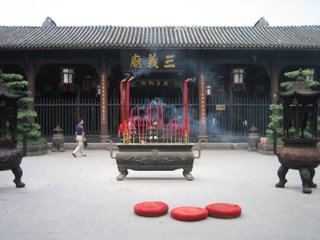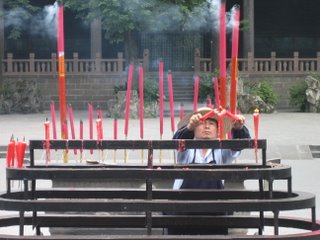1. many smiles
2. a comparison to Victoria Beckham (charming! but not too realistic by standards outside China)
3. an invitation to return to stay indefinitely in Dayi to help launch a microfinance program (see below)
Kate and I returned on Friday from our trip to Dayi. We learned much about the Rabbit King's infamous rabbit breeding operations both from the King and Queen themselves as well as on location at ten different rabbit farms where the King's philanthropy and influence can be seen first-hand. In the course of interviewing these farmers, we learned that the Rabbit King had provided each of them with free rabbits (with the Heifer Project condition that they "pass on the gift"to another family), free cages, and 10 days of intensive rabbit husbandry training. All families with more than a year of experience showed us tangible examples of their improved financial status: another year of schooling for a child, a machine to produce their own rabbit feed, a new roof over their heads, or, in some cases, televisions, cars, and vacations to Beijing. Rabbit meat is very popular in Sichuan Province.
We sat in the homes and courtyards of these farming families flanked by wandering flocks of ducklings, curious children and grandparents, and piles of fresh fruit that was eagerly pressed into our hands. After hearing of their initial successes with rabbit raising, we slowly introduced the basic concepts of using micro-loans to help farmers jump-start their mini businesses (a possibility that our sponsor organization and the Rabbit King are eager to explore together). Much to our surprise, most of the farmers had experience with borrowing money- it was generally lent by family members and was almost always used to further invest in their businesses: a new machine, another ten rabbits, expanded caging, etc. They demonstrated keen knowledge of business and entrepreneurship, as well as hopeful, but practical views of their futures.
Said a woman single-handedly taking care of her farm, 5th grader, and 70-year old parent: "Of course I think the future will be better. I don't expect a magnificent building, but I do expect a practical, better future."
These are big words coming from a population that is in a financial crisis. A clash of interests has emerged in the name of environmentalism in rural Dayi County. The local coal mine pollutes the river that runs through may of the villages, and too much of the forest land has turned into plowed squares. The government, recognizing this, is taking back a substantial amount of the farm land and returning it to the natural forest, and in 2008, the coal mine will close forever. Environmentally, these are fantastic choices. Socially? Entire communities are losing their two primary sources of income. How then, are these farmers and miners remaining hopeful? Through their relationship with the Rabbit King, they say.
We noted that confidence, trust, and education - three important factors that play a key role in successful microfinance - were the three factors that farmers brought up in each interview. These farmers are confident in their own work and their ability to eventually live off of the fruits of rabbit breeding alone, citing the RK's trainings as one of the most important pieces in jump-starting their confidence in entrepreneurship. Through experience, they have learned to trust the Rabbit King and respond well to his personal involvement in their lives. The Rabbit King and Queen celebrate birthdays and Spring Festical with their beneficiaries. They worry along with families when a loved one is sick. And - most importantly (and impressively), they remain accessible at all times. When talking to the Rabbit King, one can count on being interrupted at least four times by a digital blasting of Beethoven's Ode to Joy coming from the cell phone in his pocket. He will smile, excuse himself, listen intently to a farmer's problem, then stay on the phone as long as it takes until the problem is fixed. Every farmer we talked to had personally called the rabbit King for advice - many did so on a daily or weekly basis. (When one considers the 300,000 farmers that have made their way through the RK's training school over the last 20 years, this becomes an impressive fact.)
The Rabbit King's work made quite the impression on me, and our work seemed to make a large impression on the Rabbit King and Queen as well. As we ate hotpot with them on our last night, the Rabbit King turned to me and said: "When we start this microfinance program, you must come back to help us. You and your nose. Both are unforgettable."


